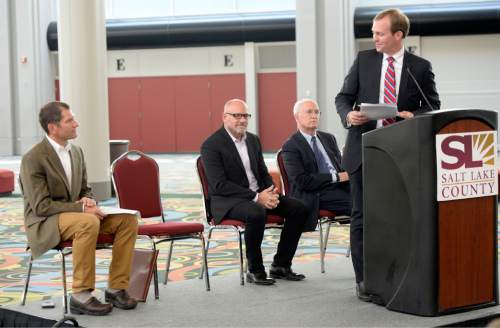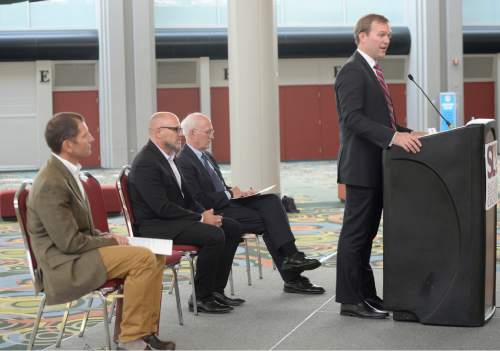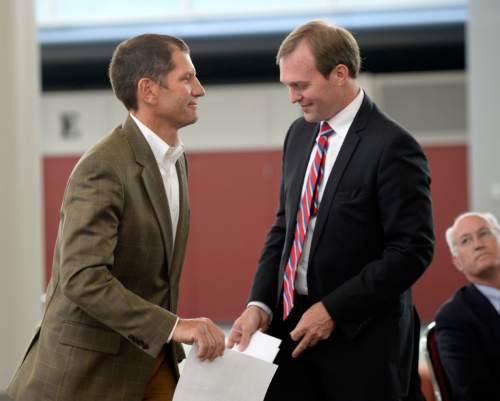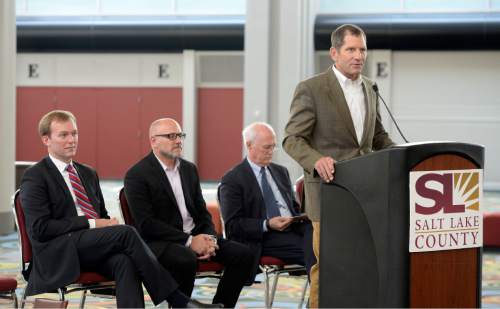This is an archived article that was published on sltrib.com in 2015, and information in the article may be outdated. It is provided only for personal research purposes and may not be reprinted.
The Outdoor Retailer summer and winter trade shows, Utah's biggest annual conventions, will be staying in town through the summer of 2018.
Salt Lake County leaders announced Monday that the biannual shows, which generate millions of dollars for Utah's economy, will stick with a nearly 20-year tradition.
With the exception of the 2002 show that was moved due to the Winter Olympics, the event has been held in Salt Lake City since 1996.
Concerns about a lack of a convention hotel, space problems within the Salt Palace and Utah's conservative public-lands policies had raised questions about the future of the shows beyond 2016.
In the end, the retailers decided to stay, bypassing other convention cities reportedly in the running, including Chicago, Las Vegas and Orlando.
"For the owners of the show, this is about business," said Scott Beck, president and CEO of Visit Salt Lake. "This was the right business decision."
Outdoor Retailer shows bring manufacturers to the Salt Palace to showcase the latest in outdoor equipment to retailers who come from across the globe to order that gear for sale in their stores the next season. In all, about 45,000 vendors and buyers descended on Salt Lake City this year, pumping an estimated $40 million into the area economy.
The biggest problem Salt Lake City faced in keeping its most important trade show involved changing the dates. The Winter Market show was moved up a week to avoid conflicting with the Sundance Film Festival for hotel space and restaurant capacity. The Summer Market was shifted to the third week in July from early August so manufacturers have more time to fill orders for new gear.
Salt Lake County Mayor Ben McAdams said Outdoor Retailer surveyed the approximately 25,000 people who attended the recent Summer Market show about where the convention should go. About 6,000 responded. Two-thirds wanted to stay in Utah.
He said trying to fit all the show's pieces together resembles a game of Tetris.
"Moving the dates was a challenge. Getting contracts from hotels and space needs for the show was never easy," McAdams said. "Getting away from Sundance will free up hotels and space and produce more jobs and more tax revenues to offset our tax burden."
Beck said negotiating the date changes was "sort of like having 35 pounds of gold in a 25-pound bag. We are just trying to make sure all of that gold stays in the bag. That has been a really hard process the more relevant the show becomes."
Officials from Emerald Expositions, the owner of the show, did not attend the news conference.
"Salt Lake has proven to be a wonderful host to the outdoor industry and to Outdoor Retailer over the years," Outdoor Retailer Show Director Marisa Nicholson said in a news release. "The community is welcoming, supportive and we feel at home during our two weeks in town.
"We are pleased to work with the Visit Salt Lake team, city and county officials and the housing and business communities to continue to make Outdoor Retailer the most significant events for the industry."
In the end, chatter about Utah's public land policies — where the Legislature and Gov. Gary Herbert support a transfer of federal lands to state management — among manufacturers and retailers was not a major factor in the decision.
Utah-based Black Diamond President and CEO Peter Metcalf, who has expressed frustration with the Legislature's campaign to transfer public lands, said he was pleased with the decision to stay. Keeping the show in the Beehive State means it can be used as a platform and a soapbox to challenge the land-transfer movement.
"This is bad policy for Americans," he said, "and bad policy for Utahns."
At first, Metcalf said, outdoor industry executives figured the "wacky, crazy and insane idea" wasn't worth the bother of challenging."
"But that wacky, crazy idea that no one was talking about is now part of the Republican platform and funded by the Legislature with the support of the governor. We are sending apostles to other states advocating this position," he said. "The industry has realized we've got to challenge that before this is part of a mainstream platform."
Utah Office of Outdoor Recreation Director Brad Petersen said the recreation community is unified behind maintaining public access to public lands.
"I don't think anybody disagrees with the fact that maintaining public lands and keeping them open to recreationists is important," he said. "The question is what is the best way to do it?"
Petersen said discussions of the Mountain Accord in Salt Lake County, the Moab Master Leasing Plan and Rep. Rob Bishop's public-lands initiative all have components that give local leaders more autonomy in managing federal lands.
"Everybody wants more local input," he said. "The question is how do you go about that? Do they need to own the public lands, or can you work with the governing agencies today to actually bring that to fruition through Congress?"
It also seems uncertainty about development of a major convention hotel did not factor into the venue selection.
McAdams said that since the hotel would not have been finished by the end of the latest two-year contract extension, it did not figure into the negotiations this time.
Omni Hotels and Salt Lake County were not able to reach a deal earlier this year on a public-private partnership. County leaders plan to reopen the bidding process in September with hopes of finding a partner by year's end.
Twitter @tribtomwharton —
Future Outdoor Retailer dates
2016:
Winter Market, Jan. 7-10
Summer Market, Aug. 3-6
2017:
Winter Market, Jan. 7-10
Summer Market, July 26-29
2018:
Winter Market, Jan. 6-9
Summer Market, July 25-28









